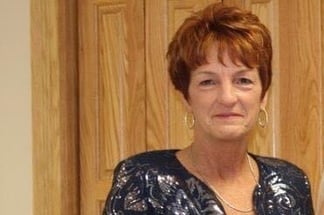Peer Spotlight: Cinda Sterner - Reeve Foundation
It took Cinda Sterner a couple years to accept living with quadriplegia after a fall down her basement stairs in 2016 left her with a C5, C6 incomplete spinal cord injury (SCI).
“I was always hoping for something else, a different outcome,” says Sterner. “Nobody knows what you are going through. People want to help but unless you’ve been injured, you just can’t understand.”
Sterner lives about two hours from Pittsburgh, Pennsylvania and has no spinal cord injury support groups or resources nearby. Last summer when she was going through the Christopher & Dana Reeve Foundation’s website, she decided to reach out to the Peer & Family Support Program for a peer mentor. Sterner says her life changed when she was connected with Sheila.
“It was meant to be. Not a day goes by that Sheila and I haven’t communicated. She is a godsend to me,” says Sterner who is 62-years-old and retired from a 25-year career at Northwest Bank in 2018. She also enjoys rock painting, scrapbooking, gardening, birdwatching and watching her grandchildren play sports. “We have so much in common. It is great to have someone I can talk to who understands life with paralysis and is always so positive.”
Most of the pair’s communications occur using Facebook Messenger. They have only talked on the phone once through FaceTime and they have never met in person. Sterner is able to use a walker and stand-up wheelchair, but she can experience intense nerve pain riding in a car. Since Sheila lives in Massachusetts, the two hope to meet halfway one day.
“She is my one go-to person about anything related to paralysis. I have no one else I can talk to,” says Sterner. “We talk about everything from medications to mood swings. We talk about family and hair styles, sex and divorce. I don’t think there is anything we haven’t talked about.”
Sterner is one of the many who have discovered the benefits that come from having a mentor. Research confirms that quality mentoring relationships have powerful positive effects in a variety of situations. Mentoring supports better social attitudes and relationships and a reduction in depressive symptoms. When people know there is someone who cares about them, it assures them they are not alone in dealing with day-to-day challenges, and it makes them feel like they matter.
In one national study, mentees reported a redefined sense of their limitations and increased self-confidence, hope, motivation, acceptance, participation and overall well-being. Another study found that one-to-one peer mentoring improves self-efficacy and reduces unplanned hospital readmissions following inpatient rehabilitation for people living with SCI.
Sterner would certainly concur with mentoring’s positive impact. Along with regular exercise and physical therapy, finding a mentor is at the top of her list of recommendations she would give others living with a spinal cord injury.
“I bless the Reeve Foundation for having a mentor program. I never could have imagined how impactful a mentor could be,” says Sterner. “I read many of the foundation’s newsletters and blogs, but it is different being able to actually talk to someone who is also going through this.”
Inspired by what Sheila has been able to do for her as a mentor, Sterner is now considering becoming a mentor herself.
“I can’t say enough about how having Sheila as a mentor has helped me,” says Sterner. “Living with a spinal cord injury takes a lot of work. You have to take one day at a time and try to find at least one thing that is good in each day. Sometimes, Sheila’s support and guidance are the thing that makes a difference on a challenging day. I can’t imagine my life without her friendship.”
For more information on the Peer & Family Support Program and to request a mentor, please go to https://www.christopherreeve.org/get-support/get-a-peer-mentor.
References for studies:
Study #1: https://www.ncbi.nlm.nih.gov/pubmed/26728176
Study #2: https://www.tandfonline.com/doi/abs/10.1080/10790268.2019.1645407
Join Our Movement
What started as an idea has become a national movement. With your support, we can influence policy and inspire lasting change.
Become an Advocate